Britain, France, Germany Won't Lift Iran Sanctions Set to Expire Soon
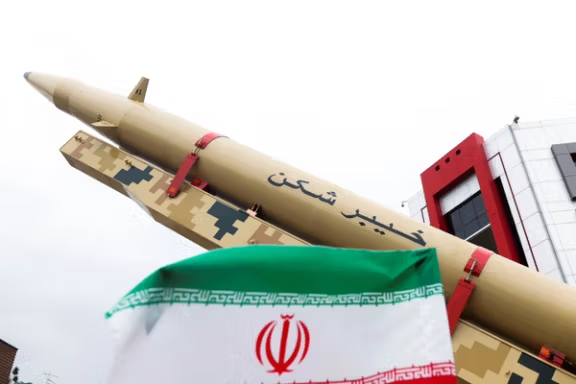
The EU said in a statement that Britain, France, and Germany do not intend to lift the sanctions against Iran, which were supposed to expire on October 18th.

The EU said in a statement that Britain, France, and Germany do not intend to lift the sanctions against Iran, which were supposed to expire on October 18th.
Josep Borrell, the European Union's Foreign Policy Chief, announced in a statement on Friday that he has received a letter from the foreign ministers of France, Germany and the United Kingdom informing him about an issue concerning the implementation of Iran’s commitments under the Joint Comprehensive Plan of Action (JCPOA).
“The Foreign Ministers stated that Iran has been in non-compliance since 2019 and considered that this has not been resolved through the JCPoA’s Dispute Resolution Mechanism (DRM). They expressed their intention not to take the steps regarding the lifting of further sanctions on JCPoA Transition Day on 18 October 2023,” reads the statement.
Borrell's reference is to one of the sunset clauses of the JCPOA, according to which on October 18, the sanctions imposed by the European Union against Iran, which included missile and arms sanctions, were supposed to be lifted.
Based on Annexes of UN Security Council Resolution 2231, the European Union had agreed to lift the sanctions on Iran in the eighth year of the JCPOA's implementation.
One year after former US President Donald Trump decided to unilaterally withdraw from the JCPOA and impose sanctions on Tehran, Iran gradually stepped away from its commitments within the framework of the JCPOA by increasing the level of uranium enrichment.
Negotiations to revive the JCPOA, aimed at bringing Iran to its commitments within the agreement, came to a halt last year without results. After the failure of the talks, the United States accused Iran indirectly of non-JCPOA-related demands.
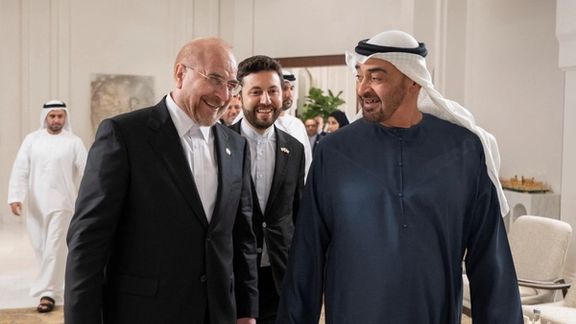
Iran should make a more concerted effort to circumvent sanctions, Speaker of Parliament, Mohammad Bagher Ghalibaf, told a gathering in Tehran on Friday.
Ghalibaf, a former senior commander of the Revolutionary Guard and a politician close to the family of Iran’s ruler Ali Khamenei, addressed the issue while speaking on Friday to a group of Iranian businessmen while visiting the United Arab Emirates. He criticized lack of coordination “between the government and the private sector to neutralize sanctions.”
Ghalibaf told the Iranian businessmen, “Sanctions are a political matter that certainly needs to be pursued in the field of foreign policy, and actions are being taken in this regard. Another issue is neutralizing sanctions, which both the public and private sectors must reach a common understanding on.”
While Iranian officials have been demanding the lifting of US economic sanctions, they have also consistently underlined the necessity to circumvent the restrictions. In October 2018, Khamenei said Iran will "slap" the United States by defeating US sanctions on Iran’s oil exports and international banking imposed a few months earlier by the Trump administration, after it withdrew from the Obama-era JCPOA nuclear deal. "With the grace of God, we will defeat sanctions. And the defeat of sanctions is the defeat of America," Khamenei said.
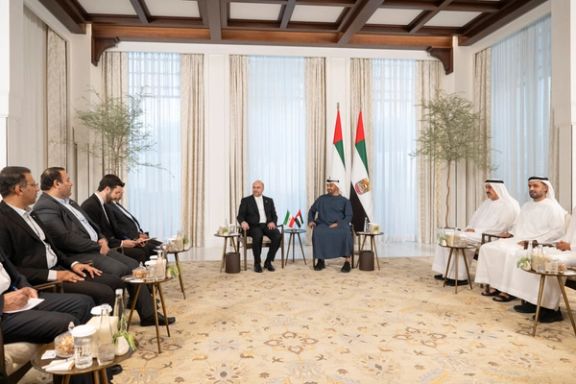
US sanctions held steady during the Trump years, and Iran’s oil exports dropped to as low as 250,000 barrels a day compared with more than 2 million before the sanctions, but Tehran managed to gradually increase shipments after President Joe Biden won the 2020 election.
Ghalibaf stressed that the Iranian government should coordinate better with private firms “outside Iran” to bust the sanctions, a reference to the significant role Iranian expatriate businessmen can play, especially in the United Arab Emirates.
Although the Biden administration has periodically sanctioned individuals and firms secretly helping Iran in its illicit trade activities, the pressure apparently has not been enough, driving Tehran’s oil exports to 1.8 million barrels per day in mid-2023. Companies in the region, including in the UAE have acted as middlemen in arranging illicit Iranian oil shipments to Asia and even laundering the money back to Tehran.
In August 2022 for example, the United States imposed sanctions on Chinese and other firms it said helped to sell tens of millions of dollars in Iranian oil and petrochemical products to East Asia.
But recently, the Biden administration agreed to allow the release of a whopping $8.7 billion in frozen Iranian funds in exchange for freeing five US hostages held in Iran. The move not only brought a windfall for Tehran but according to critics could endanger more Americans in the future.
However, the Speaker of Iran’s parliament urged expatriate businessmen to attempt to circumvent US sanctions, which in essence could jeopardize the interests of the host country, in this case the UAE.
“There are ways to neutralize sanctions," he said. "Unfortunately, the public and private sectors of the country have not been able to coordinate themselves to neutralize sanctions, and as a result, this coordination should also take place outside the country. Therefore, this coordination needs to be closely, deliberately, intelligently, swiftly, and precisely carried out. There is no insurmountable task in this field, and the only issue is the lack of coordination and organization between the private and public sectors.”
Ghalibaf went further and called for more efforts involving the UAE to circumvent the sanctions. "Unfortunately…In this regard, one of the areas that has received less attention is our communication with neighboring countries, especially the United Arab Emirates, which has historically been one of the pillars of our trade in both the public and private sectors."

The UN Human Rights Council has announced that its fact-finding committee on Iran is probing the reported assault on a 16-year-old girl, who is in coma at a Tehran hospital.
Armita Geravand suffered a severe head injury when reportedly hijab enforcers used physical force in the subway on October 1 because she was not wearing a headscarf.
UNHRC stated, "We are investigating the reported assault of 16-year-old Armita Geravand for alleged non-compliance with mandatory hijab laws, one year after the death in custody of Mahsa Amini. Women's right to equality must be upheld."
Amnesty International has also urged the global community to press Iranian authorities to permit an independent international delegation, including United Nations experts, to investigate the circumstances leading to Geravand’s coma after reports of an attack by compulsory hijab enforcers.
Diana Eltahawy, Amnesty International’s Deputy Regional Director for the Middle East and North Africa, stated, “Iranian authorities are waging a concerted campaign of denial and distortion to cover up the truth about the circumstances that led to Armita Garawand’s collapse, chillingly reminiscent of their bogus narratives and unplausible explanations of Mahsa/Zhina Amini’s hospitalization just over a year ago.”
Josep Borrell, the European Union's foreign policy chief, also expressed concern about Geravand’s deteriorating health, responding to an Iran International reporter in Berlin. He emphasized that reports suggest her situation resulted from a confrontation with hijab enforcement authorities and underscored that if confirmed, it would be unacceptable and unjustifiable.
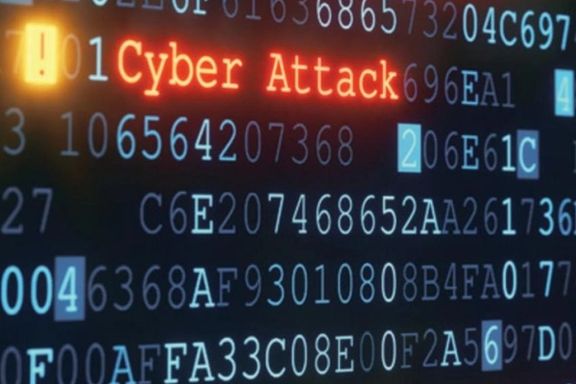
Iranian cyber operations aimed at Western entities are becoming increasingly sophisticated as part of a broader trend among state-sponsored hacking groups.
In a report published on Thursday discussing the global cybersecurity landscape, Microsoft researchers have concluded that state-backed cyber operations are growing in sophistication and aggressiveness, often combining efforts to breach computer systems with information campaigns to disseminate propaganda and towards espionage.
Over the past year, Iranian cyber operators have intensified their activities, showcasing improved offensive cyber capabilities. They have combined basic operations with complex influence campaigns designed to have geopolitical impacts. Microsoft's researchers believe that Tehran views such tools as a means to counter perceived efforts to incite unrest within Iran.
Sherrod DeGrippo, Microsoft's Director of Threat Intelligence Strategy, noted that Iranian cyber operations have become more deliberate and focused, particularly in their targeting.
“They’re getting better at leveraging vulnerabilities, they’re getting better at focused, real cyber operations, so we see them evolving,” she added.
Microsoft's comprehensive 131-page report, its fourth annual Digital Defense Report, examined broad themes within cyber operations and cybercrime landscapes and how these trends affect governments and private organizations worldwide.
In mid-April, Microsoft also reported a change in the strategy of the Iranian hacking group known as "Charming Kitten" through the release of a special report. The report also raised concerns about the potential for destructive cyberattacks by cyber groups affiliated with the Islamic Republic.

Iranian-backed Palestinian Hamas launched a coordinated and large attack on Israel on Saturday, with gunmen crossing from Gaza and a heavy barrage of rockets.
News reports said the attack presents the largest clash since 2021 when Israel and Hamas fought a ten-day battle. Israeli media reports and videos show bands of armed Hamas fighters engaging in gunbattles with Israeli forces on the streets in towns in Southern Israel.
By mid-afternoon local time, Israeli media said that at least 100 Israelis have died and more than 900 injured and scores taken hostage by the militants.
Hamas military commander Mohammad Deif announced the start of the operation in a broadcast on Hamas media, calling on Palestinians everywhere to fight.
"This is the day of the greatest battle to end the last occupation on earth," he said, adding that 5,000 rockets had been launched. Israeli media reported gunbattles between bands of Palestinian fighters and security forces in towns in southern Israel.
Prime Minister Benjamin Netanyahu said Israel “is at war” and vowed to exact an “unprecedented price” from the terror group.
“Citizens of Israel, we are at war. Not an operation, not a round [of fighting,] at war! This morning Hamas initiated a murderous surprise attack against the state of Israel and its citizens,” Netanyahu said in his filmed statement in Hebrew.
Adviser to Iran's Supreme Leader, Rahim Safavi, commended the operation dubbed Operation Al Aqsa Storm , saying , "We support the commendable operation of Al-Aqsa Storm... We will stand alongside the Palestinian freedom fighters until the liberation of Palestine and Al-Quds."
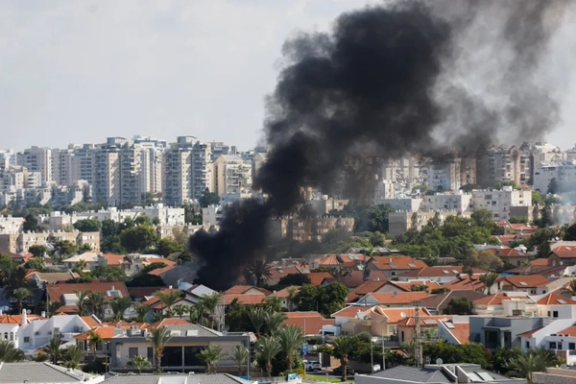
Tasnim news agency in Iran, affiliated with the Revolutionary Guard, splashed a headline claiming Israeli soldiers and police were taken prisoner by Palestinians.
Palestinian media also reported that a number of Israelis had been taken captive by fighters and Hamas media circulated video footage apparently showing a destroyed Israeli tank. The Israeli military was aware of reports of captives, a security source said, but provided no further details. It said its forces were operating inside Gaza but gave no details.
Iran International reported in early September that some Israeli security experts believed a full-fledged conflict was possible within weeks. In the meantime, there have reports in recent months of the Lebanese Hezbollah massing forces near the Israeli border and threatening to join any Israeli military confrontation with Palestinians. The Israeli defense minister Yoav Gallant threatened in August that if the Iran-backed group engages in conflict, Israeli will bomb Lebanon back “to the stone age.”
Hezbollah issued a statement saying they were closely following the situation in Gaza and are in "direct contact with the leadership of the Palestinian resistance". The statement added that it was a "decisive response to Israel's continued occupation and a message to those seeking normalization with Israel."
The Islamic Republic of Iran, which for decades has called for the destruction of Israel, intensified its rhetoric earlier this year, with officials repeatedly calling on Palestinians and other “resistance forces” to increase their attacks within Israel proper. Iranian officials began openly taking credit for support they provide to militant groups, such as the Lebanese Hezbollah that act as Tehran’s proxies in the region.

In August, after Israeli attacks on the Palestinian Islamic Jihad militant group, the Revolutionary Guard issued a statement calling for the liberation of al-Quds (Jerusalem) and the removal of “the cancerous tumor, Israel” from the world map.
The Palestinian attack comes as talks are taking place to normalize relations between Israel and Saudi Arabia. Iran has strongly condemned any move by Arab countries to establish diplomatic relations with Israel, which can further isolate the Iranian regime in the region.
On October 3, Iran’s ruler Ali Khamenei repeated his fierce opposition, saying countries that seek to normalize relations with Israel are taking a big risk. "The position of the Islamic Republic is that countries that make the gamble of normalization with Israel will lose. They are betting on a losing horse.”
Jason Brodksy, policy director of United Against A Nuclear Iran, highlighted the meetings last month between Hamas, PIJ and the PFLP factions, in Tehran, attended by the groups' leaders, which he says "provide some clues as to [the] organization of this assault on Israel today."
Many Iranian on social media began expressing solidarity with Israel. Well-Known dissident Masih Alinejad spoke out in support of the nation, condemning the attacks and putting the blame firmly in the hands of the Iranian regime.
In a long statement on X, she wrote, "We Iranians know very well who is behind this assault. Just a few weeks ago, the Hamas leadership visited Ali Khamenei the supreme leader of Islamic Republic in Tehran where Khamenei made direct threats of destruction against Israel, stating that 'Israel is dying'."
She called once more on Western nations to designate the IRGC which orchestrates Iran's regionally destabilizing activity, including its proxies which surround Israel in Lebanon, Syria and Palestine.
Last updated at 15:00 GMT
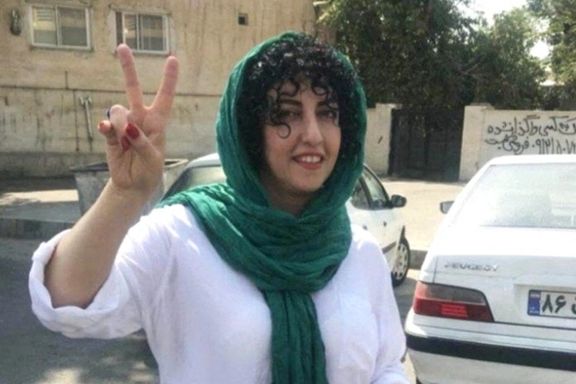
President Joe Biden and a host of Western leaders and top officials have congratulated imprisoned Iranian activist Nargess Mohammadi for winning the Nobel Peace Prize.
“Ms. Mohammadi’s commitment to building the future that women and all people in Iran deserve is an inspiration to people everywhere who are fighting for human rights and basic human dignity,” President Biden said in his statement.
UN Secretary General Antonio Guterres tweeted that the prize awarded to Narges Mohammadi is an important reminder that “women's rights are facing a strong pushback, in Iran and elsewhere,” adding, “This Prize is a tribute to all the women fighting for their rights at the risk of their freedom, health and even their lives.”
However, Iran's Foreign Ministry spokesman condemned the Nobel Peace awarded to Mohammadi as a "politically motivated move”.
“The Nobel Peace Committee has awarded the Peace Prize to a person who has been convicted for repeatedly violating laws and committing criminal acts,” Foreign Ministry Spokesman Nasser Kanani said in a statement Friday and accused “some European governments” including Norway of having “anti-Iranian and interventionist policies”.
Alleging that the Nobel Peace Committee’s decision was based on an “unconventional and selective approach”, Kanani said this was “another link in the chain of pressure from Western circles against Iran”. He added that giving the award to Mohammadi would only make the Islamic Republic determined “to pursue its independent policy”.
In a written statement to The New York Times, apparently written before the public announcement of the award, Mohammadi said the global support and recognition of her human rights advocacy makes her “more resolved, more responsible, more passionate and more hopeful”, adding that she also hoped the recognition will make Iranians protesting for change “stronger and more organized”.
Narges Mohammadi, 51, was the deputy head and spokeswoman of the Defenders of Human Rights Center, a non-governmental organization founded by Shirin Ebadi, the 2003 Nobel Peace Laureate, and others in 2001.
Iranian authorities never allowed the official registration of the organization which won the 2003 Human Rights Award from the French National Commission of Human Rights and have always persecuted its members.
An Instagram account that Mohammadi has authorized to post on her behalf thanked everyone for congratulatory messages after the news broke and said it was not possible to talk to her because political prisoners in the ward where she is held are not allowed to make phone calls on Thursdays and Fridays.
This year’s other Iranian Nobel Peace Prize candidates were also women and included US-based activist Masih Alinejad, rights campaigner Nasrin Sotudeh, as well as Elaheh Hamedi and Niloufar Mohammadi, two journalists who have been in prison for over a year for their reporting of Mahsa (Jina) Amini’s death in the custody of the morality police in September last year.
Mohammadi’s 16-year-old son Ali Rahmani has told the media that the prize belonged to all Iranians, not only her mother, for their fight, and that he is proud of his mother.
In 2015 Ali and his twin sister Kiana had to leave the country to join their father Taghi Rahmani, a journalist and former political prisoner, because their mother was going to begin serving a ten-year prison sentence and to keep safe from harassment of the authorities.
Rahmani had to flee Iran in 2012 after repeated arrest and years of imprisonment. Mohammadi’s children have been living in France since then and have never had a chance to see their mother again.
Authorities have also repeatedly punished Mohammadi by refusing to let her speak with her children and husband. Her son Ali says he has not spoken to his mother in twenty months.